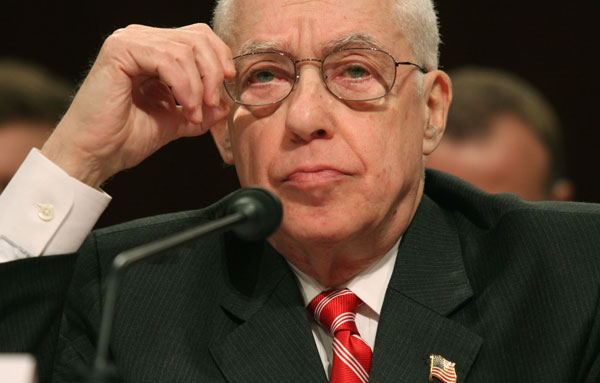Obama May Seek Authority Outlined by Mukasey
It’s been one year since then-Attorney General Michael Mukasey proposed that Congress pass legislation declaring a new, expanded war with al-Qaeda and the Taliban -- thereby granting the president the authority to detain indefinitely members of those groups anywhere in the world.
Jul 31, 20202.3K Shares477.9K Views
US Attorney General Michael Mukasey (WDCPix)
It’s been exactly one year since then-Attorney General Michael Mukasey proposed in a speechat the American Enterprise Institute that Congress pass legislation declaring a new, expanded war with al-Qaeda and the Taliban — thereby granting the president the authority to detain indefinitely members of those groups anywhere in the world where they’re found.
That proposal from a lame-duck Attorney General never got very far with the Democratic-controlled Congress. But a year later, the country is still debating that exact same detention authority. And news reports suggest that President Obama may seek precisely the same sort of authority that Mukasey was talking about.
Illustration by: Matt Mahurin
Although the Detainee Policy Task Force yesterday announced it was taking a six-month extensionon its deadline to formulate the policy, reports from National Public Radio, The Washington Postand Politicohave all quoted anonymous Obama administration officials saying the president intends to create or continue some sort of indefinite detention system for suspected terrorists associated with al-Qaeda or the Taliban, whether through new legislation or mere “consultation” with Congress.
“There is no intent in the administration to rely on anything other than congressional authority,” one senior administration official reportedly told The Washington Post.
Whether that authority would take the form of an entirely new system of administrative detention outside the authority of the laws of war, as some have proposed, or whether it would rely either on the existing Authorization for the Use of Military Force, or seek a new authorization, is unclear. The anonymous officials aren’t explaining (or don’t yet know) how the administration intends to go about solidifying its legal authority to indefinitely detain suspects without charge or trial arrested around the world.
The question arises because the Supreme Court, in Hamdi v. Rumsfeld, affirmed that the president does have authority to detain combatants arrestedon the battlefield in a conventional war, which the United States was engaged in with Afghanistan at the time. Since then, lower federal courts have ruled that the United States can detain combatants who are members of al-Qaeda or the Taliban. But it’s not clear if that authority would reach countries where there is no active combat — or if the authority described in the Hamdidecision at some point runs out.
In attempting to answer that question a year ago today, Michael Mukasey, in a speech delivered to the American Enterprise Institute, said that Congress should:
“„acknowledge again and explicitly that this Nation remains engaged in an armed conflict with al Qaeda, the Taliban, and associated organizations, who have already proclaimed themselves at war with us and who are dedicated to the slaughter of Americans—soldiers and civilians alike. In order for us to prevail in that conflict, Congress should reaffirm that for the duration of the conflict the United States may detain as enemy combatants those who have engaged in hostilities or purposefully supported al Qaeda, the Taliban, and associated organizations.
“It’s hard to see how they would end up writing anything much different from what Mukasey proposed a year ago,” said Chris Anders, senior legislative counsel for the American Civil Liberties Union in Washington. “And that was dead on arrival.” Although the issue was raised at congressional hearings, proposed legislation never received enough support even to get to the floor for a vote.
Last summer, Anders described the ideaon the ACLU’s blog as “a multi-part plan to violate the Constitution” that would “give a president worldwide power to declare anyone a terrorist and hold the person forever – without ever charging anyone with a crime.”
Although it’s possible that Obama would have more sway with Congress than Bush did, the leaders of the judiciary committees in both the House and Senate have publicly opposed a preventive detention plan that would detain suspected terrorists that the president deems “dangerous” without charge or trial; the chairmen of the House and Senate Armed Services Committees have likewise expressed reluctance.
So could Obama really get new authorization for preventive detention? Or will he try to rely on the old one, and issue an executive order or presidential memorandum clarifying (or extending) its scope? One reason he might want to seek new authorization is that, as David Kris, assistant attorney general for the Justice Department’s National Security Division, recently testifiedbefore the Senate Armed Services Committee, the authority the Supreme Court acknowledged in Hamdicould eventually “run out.” After all, the laws of war only authorize detention for the duration of active hostilities.
Anders said that in his conversations with lawmakers on the Hill, he hasn’t heard of any proposed legislation being circulated. “No one I’ve come across so far has seen or heard anything from the administration about an indefinite detention proposal,” he said.
In an e-mail, Ken Gude, associate director of the International Rights and Responsibility Program at the Center for American Progress, cautioned that new legislation could lead to far broader authority for indefinite detention than even Obama envisions.
“For me, the answer to this question decides the whole ball game — if they go to Congress, what will inevitably emerge is a broad preventive detention system regardless of what the Obama administration wants. If they rely on AUMF authority, then it can be much more narrow.”

Hajra Shannon
Reviewer
Latest Articles
Popular Articles

